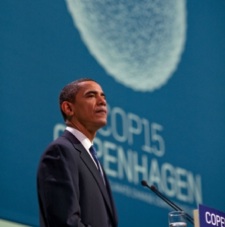
U.S. Commits to Greenhouse Gas Cuts under Copenhagen Climate Accord
U.S. plans to cut emissions 4 percent below 1990 levels by 2020--other countries such as China, India will submit plans, as well
Jan 29, 2010 - David Biello - Scientific American
 |
COPENHAGEN COMMITMENT: The U.S. formally submitted its commitment to cut greenhouse gas emissions by 4 percent below 1990 levels--pending legislation being passed.
Official White House Photo by Pete Souza |
The U.S. officially committed in writing yesterday to the greenhouse gas emission cuts proposed by President Obama in Copenhagen—4 percent below 1990 levels by 2020. The letter to the United Nations Framework Convention on Climate Change (UNFCCC) commits the nation to combat climate change, but with a caveat: any such commitment must be backed by legislation, which has not passed the U.S. Senate.
"The U.S. submission reflects President Obama's continued commitment to meeting the climate change and clean energy challenge through robust domestic and international action that will strengthen our economy, enhance our national security, and protect our environment," said U.S. climate negotiator Todd Stern in a prepared statement announcing the commitment. "We expect that all major economies will honor their agreement in Copenhagen to submit their mitigation targets or actions."
Already, four major developing countries—Brazil, China, India and South Africa—have indicated they will also submit their national plans by the January 31 deadline as part of the Copenhagen Accord. China will cut its carbon intensity (the amount of greenhouse gas emitted per widget produced) by at least 40 percent; India has promised a similar intensity cut of at least 20 percent. Brazil, meanwhile, has passed a law that requires the country to cut greenhouse gas emissions by at least 36 percent below present values by 2020, whereas South Africa will slow the rise of its greenhouse gas emissions from coal by 34 percent by the same year. Also, the European Union will cut its overall emissions by at least 20 percent below 1990 levels by 2020.
At least 29 countries have indicated they will join the accord, representing more than 70 percent of global greenhouse gas emissions, according to the U.S. Climate Action Network. "The Copenhagen Accord reflects a political consensus on the long-term, global response to climate change," said UNFCCC Executive Secretary Yvo de Boer at a January 20 press conference. "If countries follow up Copenhagen's outcomes calmly, with eyes firmly fixed on the advantage of collective action, they have every chance of completing the job."
The Copenhagen Accord, however, is not a legally binding treaty, de Boer noted—something the world now hopes to have in place for the next global climate summit in Mexico City this fall. That means the accord's provisions may or may not be honored.
But the federal government will cut its own greenhouse gas emissions—at facilities ranging from the U.S. Department of Defense to the Post Office—by 28 percent by 2020, regardless of legislative action, per plans released today to fulfill an Obama administration executive order. The U.S. currently operates more than 600,000 vehicles, purchases more than $500 billion in goods and services, and occupies nearly 500,000 buildings—all of which will now be subject to a series of goals, such as a 30 percent reduction in petroleum use by 2020.
For example, the Internal Revenue Service will revamp its facility in Andover, Md., to reduce energy use by more than 25 percent through light monitors, rooftop photovoltaic solar cells, efficient electrical devices, and a geothermal heating and cooling system.
"As the largest energy consumer in the United States, we have a responsibility to American citizens to reduce our energy use and become more efficient," Obama said in a prepared statement to announce the programs. "Our goal is to lower costs, reduce pollution, and shift federal energy expenses away from oil and towards local, clean energy."

|

